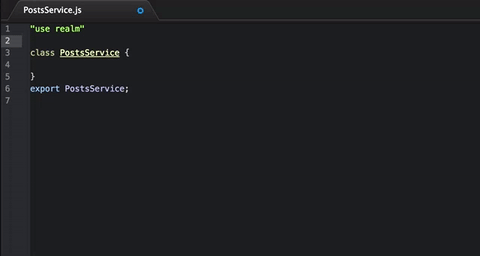realm-js v1.1.97
Realm-js
Imagine js imports on steroids! Realm-js respects promises, super fast as transpiling, supports aliases and runs in an isolated universal environment.
READ THIS MEDIUM POST TO DIVE IN

Features
- 100% Universal
- Improved import system - Packages, aliases
- Promise based
- EC7 friendly - decorators
- Automatic environment separation (backend, frontend, universal)
- Backend encapsulation / Bridges
- Extremely fast compilation (50-70ms) to transpile a big project
Realm-js on medium
https://medium.com/@ivanorlov/universal-bridging-1e3a08015a44#.eubj7asfz

https://medium.com/@ivanorlov/let-there-be-promise-and-there-was-then-e2fd94a0b2f9#.gwczuvuhv

Usage
"use realm";
import FeedParser, GoogleFeed from app.blogs;
class Application {
static main() {
GoogleFeed.getFeed("Official Google Blogs").then(function(entries) {
var entries = FeedParser.getEntries(entries);
console.log(entries);
});
}
}
export Application;Try it now!
git clone https://github.com/realm-js/universal-app-example
npm install
cd universal-app-example
gulp startToDo service is isolated. Frontend can access the interface, however code is hidden from the end users.
Univeral mode. File will be put into universal.js
"use realm";Frontend mode. File will be put into frontend.js
"use realm frontend";Frontend mode without wrapping. File will be put into frontend.js
"use realm frontend-raw";Backend mode. File will be put into backend.js
"use realm backend";Backend mode without wrapping. File will be put into backend.js
"use realm backend-raw";Bridge mode, the source will be put into backend.js, interface into frontend.js
"use realm bridge";Using Bridges
Sometimes you need to have your code encapsulated. Say, secured calls involving authentication; In this case, bridge is the most suitable case.
Before proceeding, you need to install realm-router (it will actually proxy frontend requests) Set up you express application like so:
var router = require("realm-router");
realm.require('realm.router.Express', function(router) {
app.use(router(["realm.router.bridge"]))
})Include realm-router frontend build file into your html file. And start bridging!
"use realm bridge";
class Auth {
static login()
{
}
}
export AuthRemember that only static methods are exposed.
Transpiler
Universal transpiler will output 3 files: backend, frontend, universal
gulp.task('build-universal', function() {
return realm.transpiler2.universal(__dirname + "/test-universal/", "test_build/").then(function(changes) {
console.log(changes)
})
});Install
npm install realm-js --saveUnder the hood
You can use realm-js without transpiler
Creating modules/services
realm.module("MyFirstModule", function() {
return new Promise(function(resolve, reject){
return resolve({hello : "world"})
});
});
realm.module("MySecondModule", function(MyFirstModule) {
console.log(MyFirstModule);
});Require a module
Code:
realm.require(function(MySecondModule){
console.log(MySecondModule)
});Will resolve all required dependencies. The ouput:
{hello: "world"}Require a package
You can require a package if you like.
realm.requirePackage("app.components").then(function(components){
});Annotation
Clearly, if you don't use ec6, or any other transpilers, you need to annotate modules
realm.module("myModule", ["moduleA", "moduleB"], function(moduleA, moduleB){
})A simple import
If a module does not belong to any package:
import ModuleIf a module belongs to a package:
import Module from appGiving it alias
import Module as mod from appExplicit module name (not recommended)
Dealing with promises
Realm-js has a set of functionality that helps solving many problems or impediments related to Promises
Each
Iterates a list of promises (objects) consecutively. Respects promises if provided
var a = [1, 2, 3];
realm.each(a, function(num){
return new Promise((resolve, reject) => {
setTimeout(function(){
return resolve(num++)
}, num);
})
}).then(function(result){
// [2,3,4]
});And another example with optional Promise
realm.each(a, function(num){
if( num ===3) {
return new Promise((resolve, reject) => {
setTimeout(function(){
return resolve("gotcha")
}, 1);
})
}
return num;
}).then(function(result){
// [1, 2, "gotcha"]
})Chains
Chain are very helpful when you have a logic flow, and you need to split it up, and keep you code clean. All methods are executed in strict order. You can call it a waterfall.
class MyChain {
setFoo() {
// I am the first one. And i set this.foo = "foo1"
return "foo1";
}
setBar() {
// I am the second one, and i have "this.foo" at my disposal
// And i set this.bar = "bar1"
return "bar1";
}
justSomethingFunky()
{
// I am the third one, and everyone will wait for me
let self = this;
return new Promise(function(resolve, reject){
// But i will not assign anything
// Just have to resolve myself
return resolve(self.bar)
})
}
setHello()
{
// I am the last to be executed, and i will assign this.hello = "world"
return "world";
}
}
realm.chain(MyChain).then(function(result){
// {foo : "foo1", bar : "bar1", hello: "world" }
});Executes methods in defined order. If a setter is defined, realm will assign the result into the instance of a class.
Formatting the output
You can format the output as well using "format" method.
class MyChain {
setFoo() {
return "foo1";
}
setBar() {
// I am still executed
return "bar1";
}
format()
{
return {
hello : this.foo
}
}
}
realm.chain(MyChain).then(function(result){
// {hello : "foo1" }
});Contribute
Please, contribute!
10 years ago
10 years ago
10 years ago
10 years ago
10 years ago
10 years ago
10 years ago
10 years ago
10 years ago
10 years ago
10 years ago
10 years ago
10 years ago
10 years ago
10 years ago
10 years ago
10 years ago
10 years ago
10 years ago
10 years ago
10 years ago
10 years ago
10 years ago
10 years ago
10 years ago
10 years ago
10 years ago
10 years ago
10 years ago
10 years ago
10 years ago
10 years ago
10 years ago
10 years ago
10 years ago
10 years ago
10 years ago
10 years ago
10 years ago
10 years ago
10 years ago
10 years ago
10 years ago
10 years ago
10 years ago
10 years ago
10 years ago
10 years ago
10 years ago
10 years ago
10 years ago
10 years ago
10 years ago